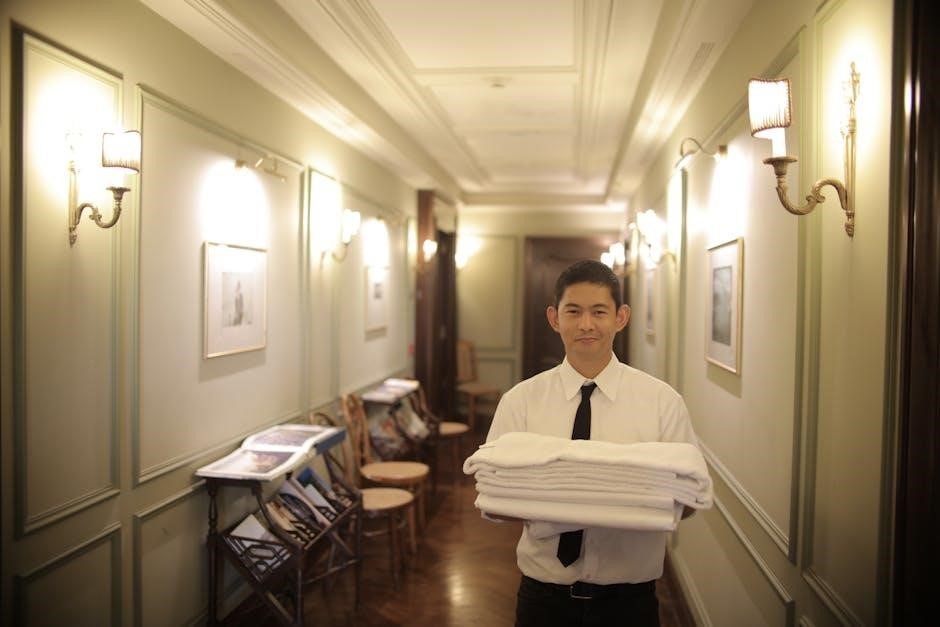Albert Camus’s The Guest explores moral dilemmas and existential themes through Daru‚ a schoolteacher in Algeria‚ grappling with duty‚ freedom‚ and cultural conflict during French colonial decline․
Background Information
Albert Camus’s The Guest was first published in 1957 as part of his short story collection Exile and the Kingdom․ Set in Algeria during the final years of French colonial rule‚ the story reflects Camus’s deep connection to his homeland and his nuanced understanding of its cultural and political tensions․ Born in Algeria in 1913‚ Camus drew heavily from his experiences growing up in a French-Algerian community‚ as well as the broader societal shifts following World War II․ The story captures the moral and existential dilemmas faced by individuals caught between colonial authority and indigenous traditions․ Through its sparse prose and vivid imagery‚ The Guest explores themes of duty‚ freedom‚ and the complexities of human choice‚ all set against the backdrop of Algeria’s arid landscapes․ Camus’s work remains a powerful exploration of the absurd and the human condition․
Historical Context
The Guest by Albert Camus is set in Algeria during the late colonial period‚ a time of growing unrest and resistance against French rule․ The story reflects the tensions between the French colonial authorities and the indigenous Arab population‚ as well as the moral ambiguities faced by individuals like Daru‚ who is caught between his duty as a colonial servant and his personal sense of justice․ The historical backdrop of declining colonial power and rising nationalism in Algeria informs the narrative‚ as Camus explores themes of cultural conflict and the complexities of human choice․ The setting‚ with its vast‚ isolated landscapes‚ mirrors the emotional and moral isolation of the characters‚ highlighting the absurdity of their situation and the inevitability of conflict․ This historical context underscores Camus’s broader philosophical concerns with freedom‚ responsibility‚ and the search for meaning in an indifferent world․

Importance of the Story
The Guest by Albert Camus holds significant importance as a literary work that delves into profound moral and philosophical questions․ The story examines the complexities of human choice‚ duty‚ and freedom‚ set against the backdrop of colonial Algeria․ Through Daru’s reluctant hosting of the Arab prisoner‚ Camus explores themes of existentialism‚ cultural conflict‚ and the moral dilemmas inherent in colonialism․ The narrative’s sparse‚ direct style reflects Camus’s signature absurdism‚ emphasizing the isolation and ambiguity of human existence․ This tale is not only a critique of colonial systems but also a universal exploration of conscience and responsibility․ Its enduring relevance lies in its ability to provoke reflection on ethical decisions and the search for meaning in uncertain circumstances‚ making it a pivotal work in Camus’s oeuvre and world literature․
Plot Summary and Structure
The Guest by Albert Camus revolves around Daru‚ a schoolteacher in Algeria‚ tasked with escorting an Arab prisoner to another village․ Set in the Atlas Mountains‚ the story explores Daru’s moral dilemma through a sparse‚ direct narrative‚ highlighting his reluctant duty and the prisoner’s ambiguous fate․
Key Events and Turning Points
Albert Camus’s The Guest begins with Daru‚ a schoolteacher‚ being tasked by a policeman to escort an Arab prisoner to a neighboring village․ This act sets the central conflict in motion‚ as Daru is reluctant to comply․ Upon reaching an inn‚ Daru offers the prisoner food and shelter‚ showing his internal struggle between duty and empathy․ The next morning‚ Daru decides to release the prisoner‚ allowing him to choose his fate․ This pivotal moment reflects Daru’s existential choice‚ emphasizing freedom over obligation․ The prisoner’s decision to surrender himself to authorities‚ however‚ underscores the inevitability of societal constraints․ These events highlight Camus’s exploration of moral ambiguity‚ human choice‚ and the tension between individual will and societal expectations․

Themes and Symbolism in “The Guest”
Albert Camus’s The Guest delves into themes of moral dilemmas‚ freedom‚ and duty‚ while the desert landscape symbolizes isolation and the clash of cultural identities‚ reflecting internal and societal conflicts․
Existentialism and Human Choice
Albert Camus’s The Guest embodies existentialist philosophy through Daru’s moral dilemma․ As a schoolteacher tasked with delivering an Arab prisoner‚ Daru faces a choice between duty and personal freedom․ His internal conflict mirrors existentialist ideas of individual responsibility and the absence of inherent moral guidance․ The story highlights how human choices are shaped by external pressures and internal values‚ reflecting Camus’s belief in the absurdity of life and the need for self-determination․ The desert setting amplifies the isolation and ambiguity‚ underscoring the existential theme of man confronting an indifferent world․ Ultimately‚ Daru’s decision symbolizes the human struggle to find meaning and act authentically in uncertain circumstances‚ aligning with Camus’s exploration of freedom and moral accountability․

Duty vs․ Freedom
In The Guest‚ Albert Camus delves into the tension between duty and freedom through Daru’s reluctant obligation to escort the Arab prisoner․ As a schoolteacher‚ Daru feels a sense of civic duty to comply with the authorities‚ yet he is deeply conflicted by the moral implications of his task․ The story portrays duty as an external imposition‚ while freedom is an internal desire for autonomy․ Daru’s ultimate decision to release the prisoner reflects his rejection of enforced responsibility and his embrace of personal freedom‚ even in the face of societal expectations․ This conflict underscores the broader theme of individual autonomy versus institutional authority‚ central to Camus’s exploration of human morality and responsibility in a colonial context․
Nature’s Role in Reflecting Emotions

Nature plays a pivotal role in The Guest as a mirror to the protagonist’s emotional state․ The vast‚ desolate Algerian landscape‚ with its harsh climate and isolated plateaus‚ reflects Daru’s internal isolation and moral ambiguity․ The story’s setting‚ a remote schoolhouse on a high plateau‚ symbolizes Daru’s detachment from the world and his struggle with the moral burden imposed upon him․ The vast‚ empty spaces and the relentless sun evoke a sense of existential loneliness‚ while the distant mountains serve as a silent witness to Daru’s dilemma․ Camus uses nature to underscore the universality of human conflict‚ as the natural world remains indifferent to Daru’s choices‚ much like the absurd universe he inhabits․ This interplay between nature and emotion highlights the themes of isolation and the individual’s search for meaning in an indifferent world․
Cultural Conflict and Colonialism
The Guest delves into the complexities of cultural conflict and colonialism through Daru’s reluctant role in the French colonial system․ Set in Algeria during the decline of French control‚ the story portrays the tension between the French authorities and the Arab population․ Daru‚ a French-educated schoolteacher‚ embodies the internal conflict of a colonial system that demands loyalty but fosters alienation․ The Arab prisoner‚ a silent figure‚ represents the oppressed indigenous population‚ while Daru’s hesitancy to comply with the authorities highlights the moral ambiguity of colonial duty․ Camus critiques the colonial structure by showing how it isolates individuals like Daru‚ forcing them into roles that perpetuate inequality․ The story thus reflects the broader struggle of colonialism‚ where cultural identities clash‚ and individuals are trapped between duty and moral conscience․

Character Analysis
Exploring the complexities of Daru‚ the Arab prisoner‚ and the policeman‚ The Guest delves into their roles‚ revealing tensions between duty‚ freedom‚ and cultural identity in colonial Algeria․
Daru: The Reluctant Hero
Daru‚ a schoolteacher in rural Algeria‚ embodies the essence of a reluctant hero․ He is tasked with escorting an Arab prisoner to the authorities‚ a duty he accepts with great reluctance․ Daru’s moral conflict arises from his aversion to involvement in colonial authority and his sense of responsibility․ His isolation in the remote schoolhouse reflects his detachment from the broader societal norms․ Through his actions and decisions‚ Camus portrays Daru as a symbol of individual conscience and moral integrity‚ highlighting his internal struggle between duty and personal freedom․ Daru’s character serves as a catalyst for exploring themes of existentialism and human choice‚ making him a central figure in the narrative’s exploration of ethical dilemmas․
The Arab Prisoner: A Symbol of Conflict
The Arab prisoner in The Guest serves as a poignant symbol of cultural and colonial conflict․ His presence ignites a moral dilemma for Daru‚ highlighting the tensions between French colonial authority and the indigenous population․ The prisoner’s accused crime—a murder committed in a state of passion—underscores the broader ethnic and political turmoil of the time․ Camus uses the prisoner as a silent yet powerful figure‚ embodying the oppressed and marginalized․ His minimal dialogue and enigmatic presence emphasize his role as a catalyst for Daru’s introspection and the story’s exploration of justice‚ morality‚ and societal expectations․ The prisoner’s fate ultimately reflects the tragic inevitability of colonial conflict‚ making him a central symbol in Camus’s critique of oppression and human condition․
The Policeman: Representation of Authority
The policeman in The Guest embodies the oppressive authority of the French colonial regime in Algeria․ He arrives at Daru’s school‚ symbolizing the intrusion of bureaucratic duty into the teacher’s isolated life․ The policeman’s demand that Daru escort the Arab prisoner underscores the coercive nature of colonial rule; His presence enforces the state’s will‚ leaving Daru with no choice but to comply․ The policeman’s role highlights the tension between individual conscience and institutional obligation‚ as Daru is forced to participate in a system he morally opposes․ Through this character‚ Camus critiques the rigid structures of authority and their impact on personal freedom‚ illustrating how even well-intentioned individuals are complicit in systemic oppression․ The policeman’s authority thus serves as a catalyst for Daru’s existential crisis and the story’s broader exploration of duty and morality․